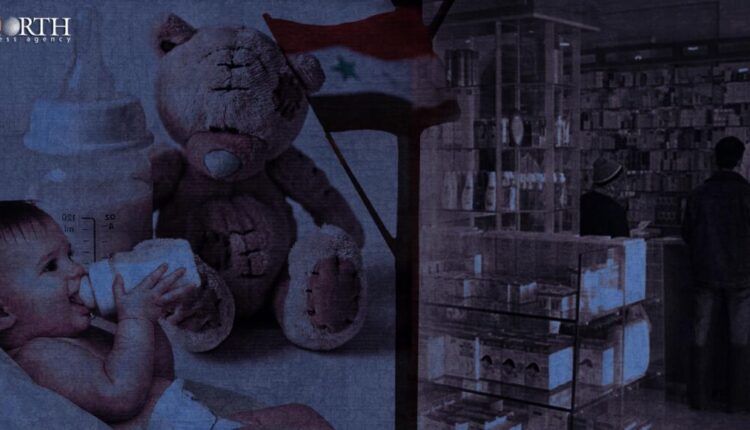Shortages of basic goods, including bread and fuel, high food costs, and ongoing inflation have become routine in Syria over the past 12 years of war. Observers can now add baby formula to that list, which as of early 2023, is also in short supply.
Baby formula began disappearing from pharmacies and grocery store shelves in government-held areas in October 2022. Nestlé products went first; local off-brand versions followed.
Thousands of new parents are finding it increasingly difficult to find the powder. When available, it is sold at exorbitant prices.
This raises several questions. Namely, how much are families forced to pay to feed their infants? What will families do? And what is driving up the cost?
“Everything has been monopolized.”
“I need a can of NAN [a Nestlé brand baby formula considered among the best], whatever the price. My child is hungry,” pleads one parent on social media. “I need a can of baby milk, no matter what brand it is,” reads another post. These are only some of the requests posted online by parents in government-held areas, which are facing a serious shortage of basic supplies for infants, including milk and medicine.
Siwar Ali, 33, from a village near Homs in central Syria, is the mother to a 7-month-old baby girl. She needs 200.000 SYP ($31) per month just for infant formula.
“It is no longer a matter of price, but being able to secure it. When NAN ran out, I was forced to resort to other brands,” Ali says.
“Everything has been monopolized, even baby milk. Last month I bought one can for 40.000 SYP ($6),” the mother added.
In order to avoid price gouging, on January 10, the Syrian Ministry of Internal Trade and Consumer Protection set the price of a 400g can of baby milk powder by Nestlé at 18.800 SYP ($2,89) and those of the Kikoz brand at 15.300 SYP ($2,35).
“A very sensitive issue”
Adel Muhammad (name changed) is a 55-year-old pharmacist in Damascus. He notes that the baby formula issue is “related to imports and the unjust laws that merchants are exposed to, including high taxes and limiting importing licenses to an inner circle of people with ties to the government.”
As the free market filled the gaps, new products entered Syria, such as baby milk from Lebanon, which “was not 100% safe for children,” Muhammad said.
The pharmacist noted that raising the price of the product, in order to persuade hoarders to sell their supplies, can only be a short-term solution, as there are no restrictions that control the Syrian market as a whole.
Daraa’s Winter Vegetables Turned into Fodder for Livestock as Economic Hardships Mount
In November 2022, two shiploads of baby formula products arrived in government-held areas. However, they could not fully cover local market demand, Muhammad added.
North Press tried to contact owners of warehouses storing medicine and infant formula, but none wanted to comment on the shortage, saying it was “a very sensitive issue”.
Muhammad Daloua, 35, a Daraa city resident, has spent a month searching for baby formula for his four-month-old son – in vain.
Daloua told North Press that he drove across all of the cities and towns in the Daraa region looking for just one can, but no luck. “There is no baby formula in any of Daraa’s drug stores,” he complained.
Baby formula from Jordan
The severe scarcity of powdered milk for infants forced many families in Daraa to buy milk from across the border, in Jordan, despite its high cost.
Daloua had no choice but to buy his baby formula from Jordan, which comes in on trucks, even though a can cost 85.000 SYP ($13).
Babies need a can of powdered milk approximately every two days, which is equivalent to 40.000 SYP ($6) per day, a hefty sum for Syrians, whose monthly earnings seldom surpasses $20.
Daloua borrowed $200 to buy the powder in bulk in order to avoid the fluctuating currency and to ensure that his baby would not run out of milk.
“I just can’t imagine how much worse it is for a lot of other parents who don’t have the resources and the ability to feed their kids,” the father concluded.
Anas al-Rifa’i (name changed) is a 38-year-old truck driver between Syria and Jordan. He told North Press that many Syrians residing in Jordan buy baby formula and send it with them to their relatives in Syria.
Al-Rifa’i pointed out that Jordanian customs officials are turning a blind eye to the increase in shipments of infant formula from Jordan to Syria, but they have warned the drivers that the quantities should be kept under six cans or they will be forced to pay a fine.
The trucker explained that the price of infant formula in Jordan is very high compared to Syria. Previously, it was exported by merchants from Syria to Jordan. However, today the opposite is the case.
What is the problem?
Moafaq al-Lababidi (name changed) works at a drug warehouse in the city of Daraa. He told North Press that the fluctuation in the exchange rate of the Syrian lira to the dollar forced merchants to give up importing powdered milk.
He demands that the Syrian Ministry of Health provide a suitable dollar price for exports for warehouse owners. In other words, the Syrian government should offer them the $1 to 4.522 SYP exchange rate, the official rate set by Syria’s central bank, instead of the black-market rate of $1 to 6.500 SYP.
Lababidi noted that the price of a can of infant formula at the black-market rate is not suitable either for warehouse owners or for consumers.
He further explained that Syria’s Ministry of Health fines merchants if they sell products at prices higher than those set by the ministry. This would make merchants incur major losses. Consequently, they halted imports of baby powder.


